Sketch of Public Policy Communion, November 2018
|
2018年11月份國政聯誼會縮影 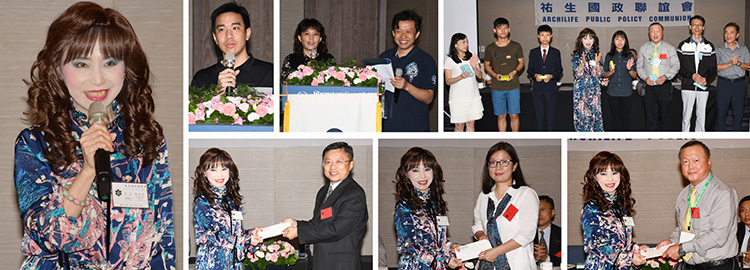 本會已於2018年11月11日台北喜來登大飯店地下二樓壽廳舉行「祐生國政聯誼會」。在主持人黃晉英秘書長宣布後揭開當日活動序幕,在輕鬆、活潑的節目過後,隨即由主持人帶來重要訊息:「近來全球重大事件頻仍,諸如羅馬下冰雹、威尼斯遭洪水侵襲、中美貿易大戰及美國期中選舉等,情勢動盪不安。因此,基金會長期培養祐生成員,其目的就是希望大家能適時為國家社會貢獻一已之力,也請各位做好準備。另外,外在環境變化導致社會各層面變動,許多法令也隨之修正,期能因應時勢,遏止弊端產生。最後,分享近期發表的演講所提及的標語 "FORTUNE",也就是「Face the problem、On time、Risking you can afford first、Thank you、Under my management will definitely get better、Name is signed, you need to keep your promise、Early bird gets the worm」,期望大家能落實在行事準則中,與大家共勉之。」 The November Archilife Public Policy Communion of 2018 was held on November 11, 2018. After a series of relaxing and fun activities, Secretary General Huang Chin-ying made the following announcement, "Recently, there are many incidents happening around the world, causing turbulent situations, such as the hail fall on Rome, Venice being flooded, the trade war between China and USA, the mid-term election in USA and others. Therefore, the Archlife Foundation has trained its members for a long time with the purpose of expecting everyone to contribute their effort to this country and society when needed. We also ask everyone to be prepared. In addition, external environmental changes will result in social changes and law amendments accordingly. I expect everyone to cope with the time and circumstances accordingly to prevent malpractices. Finally, I would like to share the slogan of "FORTUNE", representing Face the problem、On time、Risking you can afford first、Thank you、Under my management will definitely get better、Name is signed, you need to keep your promise、Early bird gets the worm". I hope everyone can implement it in the guidelines." 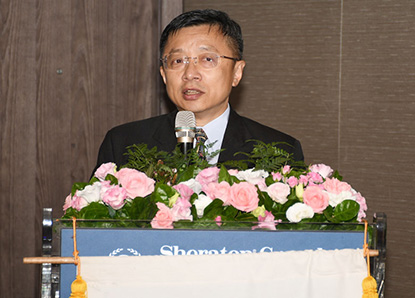 緊接著進行專題演講,由國政會委員王文安先生主講「永續之外—校園美感營造的新行動」。主講人首先表示在永續校園的一系列工作中,最重要的是培養下一代對生態的認知及永續的瞭解,而美感教育在近幾年獲得相當重視,經由教育的手段,讓孩子能擁有美的素養。主講人提出許多案例,例如廁所改造為舞蹈空間的宜蘭市復興國中,連接祖靈與學習的屏東縣泰武鄉泰武國小,以及擁抱老樹的新北市八里區米倉國小。期望藉由下一代美感素養的增加,提升人類精神文明。 緊接著進行專題演講,由國政會委員王文安先生主講「永續之外—校園美感營造的新行動」。主講人首先表示在永續校園的一系列工作中,最重要的是培養下一代對生態的認知及永續的瞭解,而美感教育在近幾年獲得相當重視,經由教育的手段,讓孩子能擁有美的素養。主講人提出許多案例,例如廁所改造為舞蹈空間的宜蘭市復興國中,連接祖靈與學習的屏東縣泰武鄉泰武國小,以及擁抱老樹的新北市八里區米倉國小。期望藉由下一代美感素養的增加,提升人類精神文明。Next on the schedule was the keynote speech. First, Mr. Wang Wen-an presented a speech on the "Besides Sustainability: New Actions in Constructing Campus Aesthetics". The speaker first mentioned that in the series of operations under sustainable campuses, the most important issue is to nurture the next generation's ecological knowledge and their understanding of sustainability. Aesthetic education has been emphasized in recent years, enabling children to be educated with aesthetics, helping students to have better personalities. The speaker also mentioned many examples, such as Fuxing Junior High School of Yilan City that has made toilets dancing spaces, Taiwu Elementary School of Taiwu Township, Pingtung County that has linked ancestral spirits with learning, and Micang Elementary School of Bali District, New Taipei City that embraces old trees. He expects that with the enhancement of the aesthetic literacy of the next generation, the spiritual civilization of mankind can be improved. 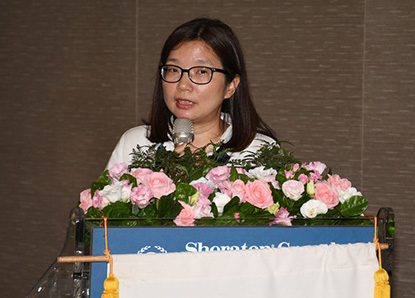 接著由國政會委員蘇美如小姐主講「地方知識如何被記憶:國家文化記憶庫的宜蘭案例」。主講人首先表示地方知識表現各地方獨特生命方式以及文化特性,因此,文化部推動國家文化記憶庫計畫及地方知識推廣應用,使之不斷積累及獲得具創新性的運用。主講人表示蘭陽博物館於107年進行公私立11家館舍、210件典藏文物之3D建置計畫,成為遠距文化研究重要的途徑。主講人接著提到宜蘭空間三十計畫,提列近30年具代表性的宜蘭地景案例,作為相關研究基礎。 接著由國政會委員蘇美如小姐主講「地方知識如何被記憶:國家文化記憶庫的宜蘭案例」。主講人首先表示地方知識表現各地方獨特生命方式以及文化特性,因此,文化部推動國家文化記憶庫計畫及地方知識推廣應用,使之不斷積累及獲得具創新性的運用。主講人表示蘭陽博物館於107年進行公私立11家館舍、210件典藏文物之3D建置計畫,成為遠距文化研究重要的途徑。主講人接著提到宜蘭空間三十計畫,提列近30年具代表性的宜蘭地景案例,作為相關研究基礎。Next, Ms. Su Mei-ju spoke on "How Can Local Knowledge be Remembered: the Case of Yilan in the National Culture Memory Base". The speaker first mentioned that local knowledge can express local unique ways of life and cultural features. Therefore, the Ministry of Culture has promoted the National Culture Memory Base project and the promotion and application of knowledge, enabling them to be constantly accumulated and applied innovatively. The speaker then mentioned the 3D establishment project that included 210 collection items from 11 public and private galleries carried out by Lanyang Museum on 2018 that has become an important route for distant cultural research. The speaker then mentioned the Yilan Space 30 Project and listed the represented landscape cases of Yilan for the past 30 years as the foundation of related researches. 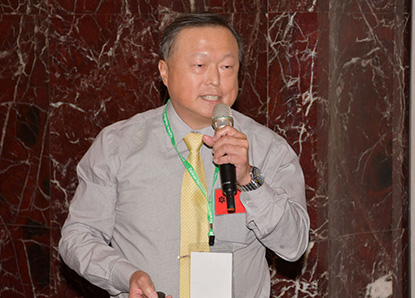 接著由國政會委員姚維正先生主講「氣候異變下基因科技與醫療大數據展望」。主講人首先表示在同樣症狀、檢驗結果或同樣疾病使用同樣藥物,效果仍有不同,可能原因有未按醫囑服藥、藥物交互作用、機率(運氣),或與體質(基因)不同有關。而精準醫療的發展,是將病歷資料,加上生物醫學檢測,並將家族病史、種族等個人資料透過人體基因資料庫進行比對分析,選出最適合病患的治療方式。大數據的困難在於其完整性、隱私權及能發展大數據的人才,但也期望透過醫療大數據整合應用,使醫生能在診斷時為病人做最適當的治療。 接著由國政會委員姚維正先生主講「氣候異變下基因科技與醫療大數據展望」。主講人首先表示在同樣症狀、檢驗結果或同樣疾病使用同樣藥物,效果仍有不同,可能原因有未按醫囑服藥、藥物交互作用、機率(運氣),或與體質(基因)不同有關。而精準醫療的發展,是將病歷資料,加上生物醫學檢測,並將家族病史、種族等個人資料透過人體基因資料庫進行比對分析,選出最適合病患的治療方式。大數據的困難在於其完整性、隱私權及能發展大數據的人才,但也期望透過醫療大數據整合應用,使醫生能在診斷時為病人做最適當的治療。Next, Mr. Yao Wei-cheng spoke on "Prospect of Genetic Technology and Medical Big Data under Climate Change". The speaker first mentioned that when taking parallel medical treatments under similar symptoms, examination results and similar diseases, there are still different effects. It may be due not by adhering to prescriptions, cross medical effects, probability (luck), or physical condition (genetic) factors. The development of precise medicine is to conduct a cross analysis with medical records, biological and medical examinations with personal information such as family history, race and physical genetic database to select the best treatment for patients. The difficulties of big data are on its comprehensiveness, right of privacy and talents that can develop big data. She also expected that through the integrated application of medical big data, doctors can make the most appropriate treatment for their patients. 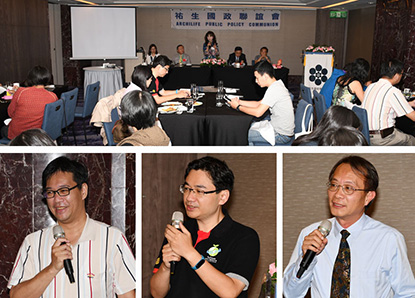 演講完畢,黃晉英秘書長代表基金會致贈謝禮予主講人。接著在與會者紛紛利用「餵豬時間」提出個人意見與看法互相交流後,圓滿地結束十一月份國政聯誼會。 演講完畢,黃晉英秘書長代表基金會致贈謝禮予主講人。接著在與會者紛紛利用「餵豬時間」提出個人意見與看法互相交流後,圓滿地結束十一月份國政聯誼會。After the speech, Secretary General Huang Chin-ying presented a gift to the speakers on behalf of the foundation. Then, attendees expressed and exchanged their opinions and views during the piggy hour. The November Archilife Public Policy Communion ended smoothly. |

